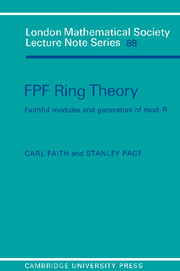
-
Select format
-
- Publisher:
- Cambridge University Press
- Publication date:
- 05 April 2013
- 26 April 1984
- ISBN:
- 9780511721250
- 9780521277389
- Dimensions:
- Weight & Pages:
- Dimensions:
- (228 x 152 mm)
- Weight & Pages:
- 0.3kg, 176 Pages
- Subjects:
- Mathematics (general), Mathematics, Algebra
- Series:
- London Mathematical Society Lecture Note Series (88)
You may already have access via personal or institutional login- Subjects:
- Mathematics (general), Mathematics, Algebra
- Series:
- London Mathematical Society Lecture Note Series (88)
Book description
This is the first book on the subject of FPF rings and the systematic use of the notion of the generator of the category mod-R of all right R-modules and its relationship to faithful modules. This carries out the program, explicit of inherent, in the work of G Azumaya, H. Bass, R. Dedekind, S. Endo, I. Kaplansky, K. Morita, T. Nakayama, R. Thrall, and more recently, W. Brandal, R. Pierce, T. Shores, R. and S. Wiegand and P. Vamos, among others. FPF rings include quasi-Frobenius rings (and thus finite rings over fields), pseudo-Frobenius (PF) rings (and thus injective cogenerator rings), bounded Dedekind prime rings and the following commutative rings; self-injective rings, Prufer rings, all rings over which every finitely generated module decomposes into a direct sum of cyclic modules (=FGC rings), and hence almost maximal valuation rings. Any product (finite or infinite) of commutative or self-basic PFP rings is FPF. A number of important classes of FPF rings are completely characterised including semiprime Neotherian, semiperfect Neotherian, perfect nonsingular prime, regular and self-injective rings. Finite group rings over PF or commutative injective rings are FPF. This work is the culmination of a decade of research and writing by the authors and includes all known theorems on the subject of noncommutative FPF rings. This book will be of interest to professional mathematicians, especially those with an interest in noncommutative ring theory and module theory.
Contents
Metrics
Full text views
Full text views help Loading metrics...
Loading metrics...
* Views captured on Cambridge Core between #date#. This data will be updated every 24 hours.
Usage data cannot currently be displayed.
Accessibility standard: Unknown
Why this information is here
This section outlines the accessibility features of this content - including support for screen readers, full keyboard navigation and high-contrast display options. This may not be relevant for you.
Accessibility Information
Accessibility compliance for the PDF of this book is currently unknown and may be updated in the future.


